Jude Knight's Blog, page 125
November 16, 2016
Seduction on WIP Wednesday
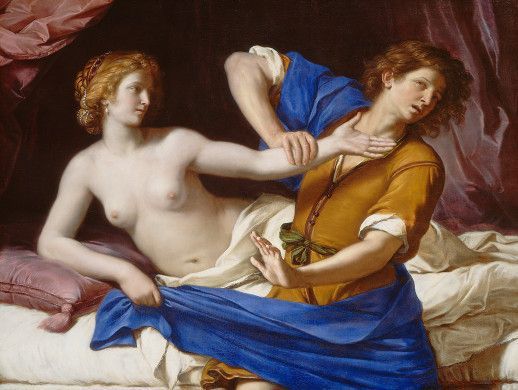
No heroine she, but I rather liked the expression on Joseph’s face as he tries to reject Potiphar’s wife.
Well, maybe not seduction, precisely, because some of us write heroes and heroines who are far too well behaved to get up to that kind of mischief, at least on our pages.
But this week, I’m looking for excerpts that show one character being aware of their physical attraction to the other, especially if they act on it.
Mine is from A Raging Madness. My heroine has not just been compromised, but assaulted, and only the quick thinking of Alex’s father has saved her. Marriage to Alex is the best way to keep her safe, but her previous marriage has left her with bad memories. Never a woman to back away from her fears, she goes to see Alex in his room.
“Is something wrong, Ella? Can I help?”
She wore an ankle-length nightrail, and as she passed in front of the fire, he could see her legs outlined through the fine material. She dropped the shawl she wore and his mouth instantly dried.
“Show me I am not cold, Alex.”
His brain had emptied, too. Surely she could not mean…? Suddenly, he realised that he was naked, and the sheets were down by his hips. He shifted to pull them up and stopped. Too late. She had seen his scarred torso and had not run screaming from the room. That was good, surely?
She was flushing; shifting from one foot to another. “You do not have to if you do not wish to, Alex.”
She thought he was rejecting her? Without stopping to think about it, he threw back the sheets, disclosing his very male reaction to her suggestion, and her eyes riveted on it.
“Someone salutes the idea,” she said, with an entirely feminine smirk. Then her uncertainty returned. “If we do this, I want you to know… If it doesn’t work, if I cannot… I will go away, Alex. I will not burden you with a wife who cannot please you.”
That raised the stakes to a whole new level.
“You will please me, Ella. You please me very much. I thought to wait out of respect to the woman who will be my wife.” He gave her his best roguish grin. “But it occurs to me that bedding you might be the best way to make sure you don’t wriggle out of this, Ella. You really are the most elusive woman! Come here.” He held out his hand, and she took one hesitant step towards him, then another until her hand was in his and he could draw her to the side of the bed. Her colour had deepened as she walked, but he could not keep his eyes on her face with her dark aureole showing through the thin fabric of the nightrail.
Almost without volition, his other hand came up to shape one breast, to linger lovingly over a nipple that tightened and peaked as he touched it.
She trembled and sucked a breath sharply through her mouth, and he looked up into her wary eyes.
“Come here,” he said again, shifting sideways in the bed to make room for her.
She allowed him to help her up on the bed, sitting beside him, upright and tense.








November 13, 2016
Tea with Cedrica
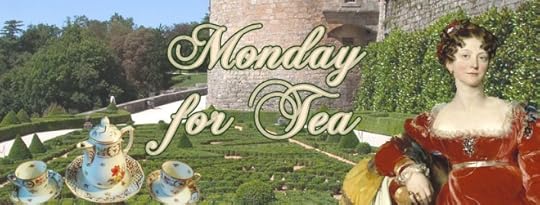 Cedrica stared out of the window, but she saw nothing of the scene before her: the rectory garden, bounded by a low wall, and beyond it the village lane; the gray church through a small gate to her left, and on the right another gate leading to the rectory orchard.
Cedrica stared out of the window, but she saw nothing of the scene before her: the rectory garden, bounded by a low wall, and beyond it the village lane; the gray church through a small gate to her left, and on the right another gate leading to the rectory orchard.
The view was as familiar to her as the shape of her hand—she had known both her whole life. But she sat and looked into the future, and which was unfamiliar and had no shape at all.
Whatever was she to do?
At least here, the villagers knew what to expect from Papa when he wandered off, visiting from cottage to cottage all over the district, bewildered that the parishioners of his youth were not there to greet him; that his beloved Hannah, Cedrica’s mother, was nowhere to be found.
The children and grandchildren of those parishioners would bring Papa back home, where—until today—he recognised his daughter and came back at least a little to himself.
Today, he had stared at her blankly, and become angry when she insisted that she was Cedrica. “This is a cruel joke,” he told her, with great dignity. “I must insist you leave before you upset my wife by taunting her with her childless state.”
In the end, cook had taken him upstairs and put him to bed, and Cedrica had come to the study, filled with memories of the kindest father in the world. Her long-awaited birth had killed her mother, but her Papa made sure she never wanted for affection. How many evenings had she played on this very hearth rug while he wrote his sermon? Here, he told her stories, taught her to read, helped her with her first stumbling letters. Here, as she grew older, they worked side by side, Cedrica proud to help her father with his careful little monographs on English wild flowers, and his letters to other botanists all of Europe.
Where were they now, all those friends with whom he had corresponded? She had written to them and to everyone else she could think of when she and the good people of the village could no longer hide their dear rector’s increasing confusion. Few had replied. Those who did sent only good wishes.
Good wishes would not save Papa from the bishop’s plans to put them out from the only home Cedrica had ever known. Oh, his letter was polite enough. The new rector would require the rectory. Mr Cedric Grenford would be better off in a place where people of failing minds were cared for. The bishop would be happy to write Miss Grenford a recommendation for a position. Perhaps as a companion to someone elderly?
In desperation, Cedrica had written to the last person her father would wish help from—the distant cousin whose great grandfather had banished his son, her own grandfather, for the unpardonable crime of falling in love outside of his class and station.
But the Duke of Haverford, head of the Grenford family, had not replied.
Movement on the lane caught her attention; a magnificent coach, pulled by four black horses, perfectly matched down to the one white fetlock. The equipage was slowing, stopping, one of the two footmen up behind leaping down to open the door with its ornate crest, and put down the carriage steps.
First through the door was a tall man immacutely dressed in a coat that hugged his broad shoulders and pantaloons that hugged… Cedrica schooled her eyes to turn back to the door, as the man himself did, holding out his hand to assist a lady to ascend. A very fashionable lady.
A great lady, as Cedrica would have known by her wise eyes and her kind face, even without her escort, the carriage, and the servants.
The footman opening the gate, and the gentleman gave his arm to the lady and led her towards the rectory door.
Cedrica shook herself. The door. With cook upstairs and the maid on her half day, Cedrica must answer the door, and there. That was the knocker.
Refusing to speculate; refusing to hope; Cedrica hurried into the hall and checked her appearance in the tiny mirror. Reddened eyes. Old fashioned dowdy clothes. She could smooth her hair back under her cap, and she did, but she could do nothing about the rest.
With a sigh, she answered the door.
“Please tell Miss Grenford that the Duchess of Haverford has come to call,” said the man, barely glancing away from the duchess.
“I will… That is, I am…” Cedrica trailed off. She was sure the duchess had never in her life opened her own door. Despite her embarrassment, she could not take her eyes off her illustrious visitor.
The duchess was shorter than her, and elegant in a redingote of a deep wine red that matched the silk flowers inside the brim of her straw bonnet. Yes. Cedrica had been correct. The lady’s eyes were kind, her mouth curving in a gentle smile.
“I think, Aldridge, that this is Miss Grenford. Miss Grenford, allow me to present your cousin, my son, the Marquis of Aldridge.”
Startled, Cedrica turned to look at the man that most of England called the Merry Marquis. He did not look like a dissolute rake. Although, to her knowledge, she had not before met a member of that tribe.
He bowed, a graceful gesture at odds with his dancing hazel eyes.
“Miss Grenford, your humble servant.”
Servant. What must two such aristocrats think of her opening her own door? Cedrica blurted, “It is the maid’s day off, and cook is sitting with Papa.” She could feel her own blush, heating her all the way from the roots of her hair to her- her chest.
“Aldridge, find the kitchen, dear, and put on the kettle,” Her Grace ordered. “Miss Grenford—or may I call you Cedrica? Cedrica, come and sit down, my dear, and you and I shall have a cup of tea and discuss the safest place for your Papa, and the best place for you. You have family, Cedrica, and we will not let you down.”
Cedrica, following her new sponsor blindly into the shabby parlour, could not stop the tears, and in moments she was in the duchess’s arms, crying on her shoulder.
“There, there, Cedrica. You have been very brave, but you are not alone any more,” the duchess assured her.
It was a great deal to take in, but the situation was too strange not to be believed. A duchess was sitting in her parlour, the shoulder of her gown damp with Cedrica’s tears. And in her kitchen, a marquis was making the tea. Cedrica’s sobs stopped on a shaky laugh.
“I beg your pardon, Your Grace.”
“Call me Aunt Eleanor, Cedrica. For we shall become very close, you and I. I have what I think you need, my dear. And you are just the person that I need.”








November 11, 2016
On the 11th hour of the 11th day…
 Armistice Day has a particular poignancy in my family. My mother was born on 11 November five years after the guns famously fell silent on the battlefields of Europe, and was named Olive in honour of the moment that ended The War to End All Wars.
Armistice Day has a particular poignancy in my family. My mother was born on 11 November five years after the guns famously fell silent on the battlefields of Europe, and was named Olive in honour of the moment that ended The War to End All Wars.
The allies won the war, and went on to lose the peace.
Peace is harder than war. It requires being willing to work together, to forgive, to see past the rhetoric and the nasty words in heated moments. Those who have won have the harder task. If they are not gracious in victory, if they take the opportunity to humiliate and torment, the peace is false and will not last.
On that morning of 12 November in 1918, when half a world away New Zealand woke to the news, the Great Depression, the Spanish civil war, the second world war, Korea, the cold war, and all the other tragedies that made strife a constant presence in the twentieth century were still to come. The joy was buoyed by hope.
Not unconstrained. Our Ministry of Health warned against public gatherings to avoid spreading the influenza epidemic. In the next two months, the epidemic killed nearly 9,000 people, half the number of New Zealanders as had died in the past four years of the war.
On 12 November, Aucklanders heeded acting Chief Medical Officer Dr Frengley’s advice not to congregate together. The only visible sign of celebration was the many flags hanging from the city’s buildings – and some of these were at half-mast in acknowledgment of the death of a former city councillor, Maurice Casey, from influenza. Unlike elsewhere in the country, shops generally remained open. But most businesses and government offices closed, included post and telegraph offices and telephone exchanges – a move that came in for severe criticism. The New Zealand Herald argued that, even though they’d kept on some emergency staff, the curtailment of these services had ‘seriously impeded’ relief work. Dr Frengley said that as Auckland was in ‘a much more serious position than any other centre’, the authorities should have referred the matter to him.
The spreading epidemic also influenced celebrations elsewhere. Some communities postponed children’s gatherings until the situation improved. Christchurch’s celebration committee struggled with this decision and only abandoned its plans after a long discussion with the District Health Officer, Dr Herbert Chesson. He objected strongly to bringing children together, commenting that there were ‘many “seedy” children’ who might persuade their mothers to allow them to attend. Dr Chesson also vetoed all general ‘indoor gatherings’, and thanksgiving services were held in the open. Featherston residents cancelled ‘a fully-organised procession of motor-cars’ out of respect for several soldiers from the local camp who had died of influenza and were being laid to rest that day with full military honours. [nzhistory.net, downloaded from: http://www.nzhistory.net.nz/war/armis...]
The thing is, what affects one person affects us all. The flu epidemic began in Kansas, in a military camp, probably jumping the species barrier from a local pig farm. From there, it travelled to Europe, and returning soldiers took it around the world. What happens in one country has repercussions everywhere. The assassination at Sarejevo began a conflict that killed tens of millions. Bombings in Iraq result in rapes on the Mediterranean and the rise of neo-Nazi xenophobia in northern Europe.
When the US sneezes, they said at the time of the Wall Street Market Crash, Europe catches cold. So though the election campaign that has transfixed the world was not my election, though I had no vote and regard the US electoral system with bemusement, I had an opinion. And a fear that the bitterness of the rhetoric has both disclosed and enhanced a deep vein of hatred and distrust.
People are not labels. The soldiers killed on the battlefields of World War 1 were not ‘Tommys’ or ‘Yanks’ or ‘Huns’—or not only. They were someone’s son, sweetheart, father. They were poets and bakers and football players. They were human beings, all individuals with unique personalities and talents.
Some of the labels that have been cast around may make people you know targets—outlets for inflamed emotions and frustrated anger. Whether you are celebrating a win or grieving a lose, stand against hatred. Please. Build the peace.








November 9, 2016
Falling for you on WIP Wednesday
 This past month has been hugely busy at work and at home. I’ve also had an inflamed shoulder and have been losing sleep, so I’ve been too tired to write on the train coming home most days. On the upside, this means I’ve caught up with a few books that have been on my Kindle app for a while, and Monday’s treat was Only a Promise, from Mary Balogh’s Survivors’ Club series. I love how each of the survivors finds a survivor to wed, and how they fall reluctantly in love, realising their feelings with great surprise. The lady is a master of the convincing relationship.
This past month has been hugely busy at work and at home. I’ve also had an inflamed shoulder and have been losing sleep, so I’ve been too tired to write on the train coming home most days. On the upside, this means I’ve caught up with a few books that have been on my Kindle app for a while, and Monday’s treat was Only a Promise, from Mary Balogh’s Survivors’ Club series. I love how each of the survivors finds a survivor to wed, and how they fall reluctantly in love, realising their feelings with great surprise. The lady is a master of the convincing relationship.
Today, I’m sharing an excerpt from A Raging Madness in which my Alex realises how he feels about Ella. Please share your excerpts in the comments.
He was very tempted to kiss her, but feared to change their relationship. Change it more. They were friends again, as they hadn’t been since she was a young girl and he a cheeky subaltern, missing his home and his family.
She had never been available for dalliance. He would be lucky to get away with a slapped face. At worst, she would assume he was courting her. How he wished he could! For the first time in his life, he was experiencing the joys of matrimony, all but the physical intimacies, and he wanted them to go on forever.
But he had no place offering Ella marriage. What could he give her but a broken crock of a man, made ugly with scars, subject to nightmares, prone to shedding splinters and lumps of metal from his leg.
A bored and useless man, at that. He had been a career officer. What was he now? He had investigated the Chirbury estates as a favour to his cousin, removing the land agents in two of them, and buttressing the third with an assistant. But for all it proved to be necessary, the task had started as make-work, and his pride would not let him accept more.
He had no idea what to do with himself, and he certainly would not inflict himself on someone he was fast coming to love.








November 7, 2016
Tea with Esther
Esther Baumann squeezed her fingers together in a futile effort to control her nerves when Miss Cedrica Grenford approached her in the anteroom to the Duchess of Haverford’s drawing room. The woman’s kind eyes behind wire-rimmed spectacles reassured her, however. She took a deep breath.
“Her Grace is so pleased you came,” Miss Grenford told her.
Esther rose to her feet, hoping she did it as gracefully as she intended. This caused Reba, her ever present companion, to do so as well.
“Would you care for refreshments, miss?” the duchess’s companion asked Reba.
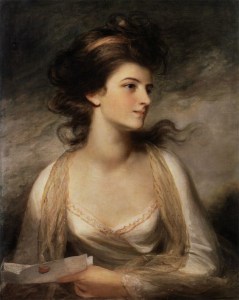 Esther put her hand on the woman’s arm. “I’ll be fine Reba. Do let Miss Grenford see to your comfort.”
Esther put her hand on the woman’s arm. “I’ll be fine Reba. Do let Miss Grenford see to your comfort.”
A moment later the door closed softly behind her, and she found herself alone with the Duchess of Haverford.
“Miss Baumann, how lovely of you to come. Your message requesting an interview pleased me.” The duchess gestured to the seat next to her with a graceful hand. Afte pouring tea, offering biscuits, and making sure of Esther’s comfort she went on, “How may I help you?”
“Oh, you already have, Your Grace. I asked to see you to thank you for your invitation to the Hollystone Hall house party and to give you my acceptance in person.” Esther handed a sweetly scented missive to the woman she admired so greatly.
“I’m delighted you will come! May I hope this means your parents have accepted my invitation as well?” the duchess asked turning the little missive over in her hand.
“I fear not, Your Grace. That is the reason I wished to speak to you face to face. My mother is not well.” Esther felt tears well up. When the duchess reached over an put a sympathetic hand on her arm they spilled over, earning her the use of a lace trimmed linen handkerchief.
After a moment to gather her emotions, Esther went on. “She worries about me attending a house party without her, and I’m loathe to worry her. Still, I want badly to come; my father has arranged for my Aunt Dinah to attend come with me.”
“Please assure your mother I will happily stand in her place while you are my guest, Miss Baumann. Will your father accompany you?”
Esther shook her head. “He tells me the demands of business forbid it.” She stiffened at that and watched for the other woman’s reaction. Many looked down on bankers like Nathaniel Baumann, and Esther would not hesitate to defend him if she had to. She didn’t.
“Men like your father are much needed in these difficult times,” the duchess replied.
Esther had a surge of pride, even greater than her relief at the woman’s sensitivity. “Yes! Even the government—” She snapped her mouth shut, aware she had almost revealed things she should not.
The duchess laughed, leaned closer, and whispered. “Yes I understand your father’s young assistant has accompanied Viscount Rochlin to Spain. Such delicate matters must weigh on Mr. Baumann.”
“How do you know that?” Esther gasped. “Adam left only last week!”
“I fear there is little my son Aldridge doesn’t know, at least a it applies to the country. Adam is it? Well, well.” The duchess’s eyes twinkled. “I will look forward to meeting this courageous young man. Shall I invite him as well?”
“He won’t come,” Esther responded morosely. “Adam… that is, Mr. Halevy, has very traditional views and a narrow circle of friends.”
“Oh dear. That must be difficult for one as outgoing as you,” the duchess replied sympathetically.
Her mood had turned gloomy, an unfamiliar situation for Esther. She took a deep breath and reached into her reticule and retrieved a heavy vellum packet, eager to change the subject. “My father asked me to deliver this to you in person as well.”
The duchess glanced over at Esther once or twice while she opened Baumann’s message. At the sight of the enclosed cheque her eyes grew wide. “My goodness, this is extremely generous.”
Esther grinned broadly. “My father is always happy to contribute. He believes very strongly in education.”
“Does he know our charity supports education for women and girls?”
“Certainly. He is…”
“Learning?” the duchess asked with a laugh.
“Conflicted,” Esther replied. “He will also contribute directly to Mr. Montefiore’s project to build a Hebrew school in London.”
“One that won’t admit girls.”
“No. It won’t.” Esther couldn’t keep the irritation out of her voice.
“You sound unhappy about that. Did you wish for that sort of education?”
“I would have liked to study the Torah at the feet of the rabbis, but I know of no girls who do. ”
The duchess sighed. “Perhaps some do and we don’t know about it yet. She raised her chin and went on, suddenly radiating the power of her position. “It is the same for all girls. We will change that. Maybe not overnight, but it will change.”
The fire in her eyes softened when she looked at Esther. “I will send my gratitude to your father and assure him he is welcome at the house party, even if he can only come for the ball.”
Esther smiled back. The duchess and the banker’s daughter’s eyes met in perfect accord.
__________________________________
It might have surprised Esther to know that some girls did have the opportunity she longed for, as Adam is about to find out.
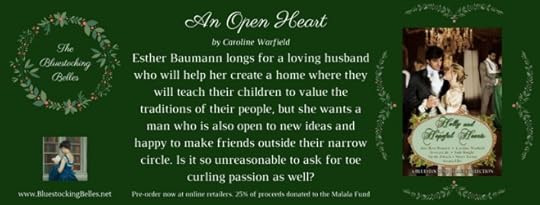 An Open Heart, by Caroline Warfield
An Open Heart, by Caroline WarfieldEsther Baumann longs for a loving husband who will help her create a home where they will teach their children to value the traditions of their people, but she wants a man who is also open to new ideas and happy to make friends outside their narrow circle. Is it so unreasonable to ask for toe curling passion as well?
Adam Halevy prospered under the tutelage of his distant cousin, powerful banker Nathaniel Baumann. He’s ready to find a suitable wife, someone who understands a woman’s role, and will make a traditional home. Why is Baumann’s outspoken, independent daughter the one woman who haunts his nights?
BUY LINKS for HOLLY AND HOPEFUL HEARTS
Amazon US: http://ow.ly/INwa3049Ey3
Amazon UK: http://ow.ly/ZMuH3049ELM
Amazon Australia: http://ow.ly/TczG3049EQ2
Amazon Canada: http://ow.ly/IERm3049EYM
Smashwords: https://www.smashwords.com/books/view/664559
Kobo: http://ow.ly/Vx1n304jGzj
Barnes & Noble: http://ow.ly/LqCI304jGuS
iBooks: http://ow.ly/JcSI304jGWE
About the Author
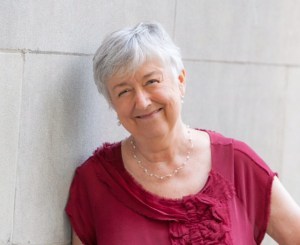 Traveler, poet, librarian, technology manager—award winning author Caroline Warfield has been many things (even a nun), but above all she is a romantic. Having retired to the urban wilds of eastern Pennsylvania, she reckons she is on at least her third act, happily working in an office surrounded by windows while she lets her characters lead her to adventures in England and the far-flung corners of the British Empire. She nudges them to explore the riskiest territory of all, the human heart.
Traveler, poet, librarian, technology manager—award winning author Caroline Warfield has been many things (even a nun), but above all she is a romantic. Having retired to the urban wilds of eastern Pennsylvania, she reckons she is on at least her third act, happily working in an office surrounded by windows while she lets her characters lead her to adventures in England and the far-flung corners of the British Empire. She nudges them to explore the riskiest territory of all, the human heart.








November 5, 2016
Not all that wise, as it turns out
In the last few weeks, more than ever before, I am convinced that the scientific name for humankind lacks something as a descriptor. Homo sapiens. Wise (or rational) man. Yeah, right.
It was invented by the father of modern taxonomy, the man who invented our double-worded system of naming biological species, the Swedish zoologist Carl von Linne. He was one of Europe’s most acclaimed scientist in the mid 18th century, and his influence was such that the name has stuck despite all the evidence that we people keep providing that we are not all that wise.
As it happens, .
 A species name should be something unique to the species; some identifying characteristic that sets that species apart from others. Felix domesticus is the domestic cat. Dendrobates azureus, a certain type of tree frog, is blue tree walker.
A species name should be something unique to the species; some identifying characteristic that sets that species apart from others. Felix domesticus is the domestic cat. Dendrobates azureus, a certain type of tree frog, is blue tree walker.
So what are our identifying characteristics as a species?
Creativity, aesthetics, language, and laughter all seem to be good candidates.
Creativity and a love of beauty
 We have only to look around at the sheer joyful profligacy of the natural world to see that creativity seems to be built into us, showing up as soon as we are old enough to start decorating ourselves and our environment. Homo creator?
We have only to look around at the sheer joyful profligacy of the natural world to see that creativity seems to be built into us, showing up as soon as we are old enough to start decorating ourselves and our environment. Homo creator?
But other animals use tools, and other animals make things. It’s impossible to say whether they enjoy doing so, although some suggest they only do so when they have another end in view. An ape tears a stick to the right length in order to insert it in a termite mound and extract breakfast. A bower bird spends hours creating an ornate pattern in order to attract a mate.
People make things for the sheer pleasure of creation. The creative impulse seems to be more highly developed in our species; so highly developed that creation itself becomes a motivator. But undoubtedly the seeds of the impulse are found in other species.
Aesthetics is another suggested separator, which would make us homo aestheticus. We take pleasure in beautiful things to see, to hear, to taste, to smell, and to touch. Is this our unique characteristic? I think not. We see in other animals a pleasure in sights, sound, tastes, smells, and touch that we would call aesthetic if the perceiver were human. More highly developed in humans? Perhaps so. But again, not unique.
The hominid that talks?
For a long time, the ability to communicate was suggested as the strongest difference between us and the rest of creation. Communication is a powerful human drive. Are we homo loquens – talking man? But two types of research have narrowed the gap with the other animals. On the one hand, animals have been taught to understand human languages, and even to communicate in a human language (sign). On the other, animal studies have shown that complex messages are passed between animals of the same species, and some messages are even understood across species. We have a spoken language that is (mostly) under our voluntary control, but this is still a matter of degree rather than type.
 What about homo ridens, the animal that laughs? We have a sense of humour. But so do dogs and other domestic animals (ask anyone who owns donkeys).
What about homo ridens, the animal that laughs? We have a sense of humour. But so do dogs and other domestic animals (ask anyone who owns donkeys).
Other contenders are homo amans – humans as loving agents, or homo generosus – generous man. Certainly these are defining characteristics of humans at their best. But unique? I don’t think so.
The meaning seekers
I like homo poetica – the hominid that searches for meaning and significance. This is certainly a strong identifier of humankind. The search for meaning and significance has built societies and civilisations. As a scientific name, it works. But I think there is one that is even more descriptive.
I have been in a conference for the past two days, listening to speaker after speaker. And the best of them, the ones who captured and held our attention, even at the end of two days after lots of coffee and little sleep, were those who offered beautiful presentations, interesting use of language, humour, generous sharing of their experience and knowledge in a way that helped us to make meaning out of our own—and one more thing. They told us stories.
That, I think, is the unique identifier. We are the animal – the only animal as far as we know – that tells stories. We use stories to build empathy, to share as knowledge, to explain meaning, to identify as a group.
I’m a Catholic Christian, and I see this pre-eminently in the public life of Jesus. He didn’t content himself with saying ‘do this,’ or ‘this means that’. Instead, he told stories that carried the message people needed to hear. We’re still mining those stories for meaning 2000 years later. But I also see it in the 2000 years following. Whenever the Church needed a new way of doing things, or a reminder of an old way, God sent us a saint to be a living story, showing us the lesson we needed to learn.
To my mind, we are homo narans, the storytelling hominid. What do you think?








November 3, 2016
And meanwhile, elsewhere in the blogosphere…
I am at a two day work conference. Great stuff! I was going to write my Footnotes on Friday blog on the revolution in kitchens in the late Georgian. I didn’t get it done before I left home, so I put all my notes in my bag. But I’ve just arrived at the place I’m staying after a long tiring day, and the post isn’t about to happen.
Sorry, folks. Instead, though, here are two other research posts you might enjoy, if you haven’t already caught up with them.
The first, about rakehells, I wrote for Jessica Cale’s Dirty Sexy History blog.
Enjoy! I’m off to have an early night before another day of conferencing tomorrow.








November 2, 2016
First words on WIP Wednesday
 I tend to cast around for a long time till I find the start of a book—and even then, I often get it wrong, either deleting what I have in favour of a later passage, or writing something earlier that leads up to my original first chapter. As a writer, I want to start in the middle of the action, but in a place that lets me bring readers into the story quickly, without a lot of explanation. I want to avoid the acronym SDT in the margins. Show Don’t Tell. My friend and editor Mari Christie sends my drafts back with that plastered through them, but so far I’ve been able to avoid the dreaded letters in my first chapters.
I tend to cast around for a long time till I find the start of a book—and even then, I often get it wrong, either deleting what I have in favour of a later passage, or writing something earlier that leads up to my original first chapter. As a writer, I want to start in the middle of the action, but in a place that lets me bring readers into the story quickly, without a lot of explanation. I want to avoid the acronym SDT in the margins. Show Don’t Tell. My friend and editor Mari Christie sends my drafts back with that plastered through them, but so far I’ve been able to avoid the dreaded letters in my first chapters.
So my methodology for starting a book is to write until I recognise the beginning, then second guess that decision once I’ve finished the first draft. Next month’s new release didn’t get its beginning until the final edit. The current work in progress still starts with the first words I wrote in May.
How about you? How do you begin? And does your beginning change as you work your way towards publication?
Here are the first words of A Raging Madness, the first draft I’m hoping to finish by the end of the month. As always, please post your extracts in the comments.
The funeral of the dowager Lady Melville was poorly attended—just the rector, one or two local gentry, her stepson Edwin Braxton accompanied by a man who was surely a lawyer, and a handful of villagers.
Alex Redepenning was glad he had made the effort to come out of his way when he saw the death notice. He and Captain Sir Gervase Melville had not been close, but they had been comrades: had fought together in Egypt, Italy, and the Caribbean.
Melville’s widow was not at the funeral, but Alex was surprised not to see her when he went back to the house. Over the meagre offering set out in the drawing room, he asked Melville’s half brother where she was.
“Poor Eleanor.” Braxton had a way of gnashing his teeth at the end of each phrase, as if he needed to snip the words off before he could stop chewing them.
“She has never been strong, of course, and Mother Melville’s death has quite overset her.” Braxton tapped his head significantly.
Ella? Not strong? She had been her doctor father’s assistant in situations that would drive most men into a screaming decline, and had continued working with his successor after his death. She had followed the army all her life until Melville sent her home—ostensibly for her health, but really so he could chase whores in peace, without her taking loud and potentially uncomfortable exception. Alex smiled as he remembered the effects of stew laced with a potent purge.
Melville swore Ella had been trying to poison him. She assured the commander that if she wanted him poisoned he would be dead, and perhaps the watering of his bowels was the result of a guilty conscience. The commander, conscious that Ella was the closest to a physician the company, found Ella innocent.
Perhaps it had all caught up with her. Perhaps a flaw in the mind explained why she tried to trap Alex and succeeded in trapping Melville into marriage, why she had not attended Melville’s deathbed, though Alex had sent a carriage for her.
“I had hoped to see her,” Alex said. It was not entirely a lie. He had hoped and feared in equal measure: hoped to find her old before her time and feared the same fierce pull between them he had been resisting since she was a girl too young for him to decently desire.
“I cannot think it wise,” Braxton said, shaking his head. “No, Major Redepenning. I cannot think it wise. What do you say, Rector? Would it not disturb the balance of my poor sister’s mind if she met Major Redepenning? His association with things better forgotten, you know.”
What was better forgotten? War? Or her poor excuse for a husband? Not that it mattered, any more than it mattered that Braxton used the rank Alex no longer held. It was not Braxton’s fault Alex’s injury had forced him to sell out.
The Rector agreed that Lady Melville should not be disturbed, and Alex was off the hook. “Perhaps you will convey my deepest sympathies and my best wishes to her ladyship,” he said. “I hope you will excuse me if I take my leave. I have a long journey yet to make, and would seek my bed.”








October 31, 2016
Tea with Charlotte
 As the Duchess of Haverford topped up their tea from a fresh pot, Charlotte helped herself to her fifth petit four. Though she had been nervous to meet Her Grace on her own, there were advantages to having tea with a Duchess. Monsieur Fournier’s little cakes were at the top of that list, with the delicious orange pekoe coming in at a close second.
As the Duchess of Haverford topped up their tea from a fresh pot, Charlotte helped herself to her fifth petit four. Though she had been nervous to meet Her Grace on her own, there were advantages to having tea with a Duchess. Monsieur Fournier’s little cakes were at the top of that list, with the delicious orange pekoe coming in at a close second.
Her Grace smiled indulgently. “Marvelous, aren’t they?”

Reproduced under a CCC. Artist, Victor Nizovtsev
Charlotte’s eyes rolled in ecstasy as she bit into the smooth pink icing. “I can’t get enough of them. I have dreams about them. The baby already has expensive tastes, God help me.” She idly stroked her enormous belly. “I eat them as fast as Cedrica brings them.”
“Do you see her often?” She lit up at the mention of her relation.
“As often as she can get away. She has been occupied with Fournier’s, of course, but stops by for tea perhaps once a week.” She finished the cake with a sip of her tea. “Mrs. Phillips says I ought to cultivate more ‘advantageous’ friendships to ease my way into the ton, but who could be better than the wife of a French chef?” She laughed. “Cedrica is my dearest friend and I so look forward to our talks.”
Her Grace looked up from her tea with gentle concern. “How has the ton been treating you? Have you had many invitations?”
Charlotte sighed. She had been a countess for all of six months, a change she had embraced with rather more enthusiasm than society had accepted her. Actresses did not marry earls, after all. London’s shopkeepers, on the other hand, had embraced her with open arms. “I have had some,” she said carefully. “Apollo’s friends, mainly. Aldridge has been lovely.”
“I would certainly hope so.” There was pride in her voice as she spoke of her son. “He and Apollo have been friends for years. They used to spar in the parlour.”
“Now they spar in ours!” Charlotte laughed.
“More tea?”
“Please.”
“Apollo is a dear boy. I wanted to thank you both for your generous donation to the girls’ school.” Her Grace stirred a drop of cream into her tea.
“Of course! I was hoping to speak to you about the school, actually.”
Her Grace smiled. “I would be delighted to talk about the school. It’s one of my favorite subjects.”
“As you know we have the orphanage in Southwark. We have more children than we have space to keep them, and so many of them are little girls. We were wondering if perhaps we might be able to sponsor a number of them to have places at the school. They’re bright enough, and I know if they have the right education, they might be able improve their situation–”
“Say no more.”
Charlotte stiffened, unsure of how the Duchess would react. Would she object to admitting working class orphans into her beloved school?
“I think it’s a wonderful idea.”
Charlotte sighed in relief. The orphans were fast becoming a crusade of hers; just the thought of helping them brought tears to her eyes. She could not be happier that she was now in a position to help them. “I’m so pleased.”
“What shall we call it?”
“Call it?”
“Scholarships often have names, sometimes in memory of the person leaving it. As you and Somerton are thankfully in good health, is there someone else you might name it for?”
Charlotte grinned as it came to her, her heart so full of joy she thought it could burst. “Might we call it the Artemis Rothschild Fund? In memory of Apollo’s late sister.”
Her Grace smiled indulgently, and Charlotte wondered how much she knew of Apollo’s family history. “Of course.”
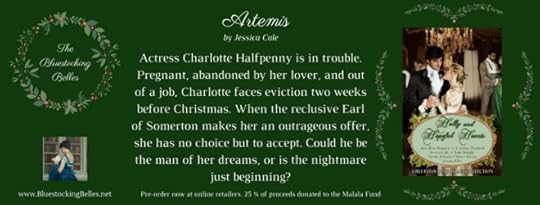
HOLLY AND HOPEFUL HEART
Read the story of Charlotte Halfpenny and the Earl of Somerton in the Bluestocking Belles’ box set, Holly and Hopeful Hearts.
When the Duchess of Haverford sends out invitations to a Yuletide house party and a New Year’s Eve ball at her country estate, Hollystone Hall, those who respond know that Her Grace intends to raise money for her favorite cause and promote whatever marriages she can. Eight assorted heroes and heroines set out with their pocketbooks firmly clutched and hearts in protective custody. Or are they?
BUY LINKS for HOLLY AND HOPEFUL HEARTS
Amazon US: http://ow.ly/INwa3049Ey3
Amazon UK: http://ow.ly/ZMuH3049ELM
Amazon Australia: http://ow.ly/TczG3049EQ2
Amazon Canada: http://ow.ly/IERm3049EYM
Smashwords: https://www.smashwords.com/books/view/664559
Kobo: http://ow.ly/Vx1n304jGzj
Barnes & Noble: http://ow.ly/LqCI304jGuS
iBooks: http://ow.ly/JcSI304jGWE
About Jessica Cale
Jessica Cale is the award-winning author of the historical romance series, The Southwark Saga. Originally from Minnesota, she lived in Wales for several years where she earned a BA in History and an MFA in Creative Writing while climbing castles and photographing mines for history magazines. She kidnapped (“married”) her very own British prince (close enough) and is enjoying her happily ever after with him in North Carolina. Visit her history blog at www.dirtysexyhistory.com.
Website: http://www.authorjessicacale.com
Facebook: https://www.facebook.com/authorjessicacale
Twitter: https://twitter.com/JessicaCale
Pinterest: https://au.pinterest.com/rainbowcarnage/








October 30, 2016
Shiny facts
 I’ve commented before that I have a jackdaw mind: I love shiny facts, and will follow the hint of one for miles through books and around the internet, until I can get my beak on it and carry it away into the recesses of my overstuffed memory.
I’ve commented before that I have a jackdaw mind: I love shiny facts, and will follow the hint of one for miles through books and around the internet, until I can get my beak on it and carry it away into the recesses of my overstuffed memory.
It might amuse you to know the books and videos currently feeding this obsession (mostly Georgian and British focused, but a few reaching into other places and other eras):
Taste: Kate Colquhuon
Smallpox, Syphilis and Salvation: Sheryl Pearson
The Enlightened Economy: Joel Mokyr
The Silk Roads: A New History of the World: Peter Frankopan
The Secret History of Georgian London: Dan Gruikshank
Crown and Country (TV series on DVD): Edward Windsor as narrator
Ultimate Rome: Empire Without Limit (TV series): Mary Beard as narrator
The Story of China (TV series): Michael Wood as narrator
I’m intending to read (and have on my bedside table):
Redcoats Against Napoleon: Carole Divall
Europe under Napoleon: Michael Broers
In these Times: Living in Britain through Napoleon’s Wars: Jenny Uglow
(Bit of a theme, there)
The Fortune Hunter: Peter James Bowman
Magpie, Squirrels and Thieves: Jacqueline Yallop
The Unruly Queen: Flora Fraser
Wilful Impropriety: Edaterina Sedia
Unquiet Lives: Marriage and Marriage Breakdown in England: Joanne Bailey











